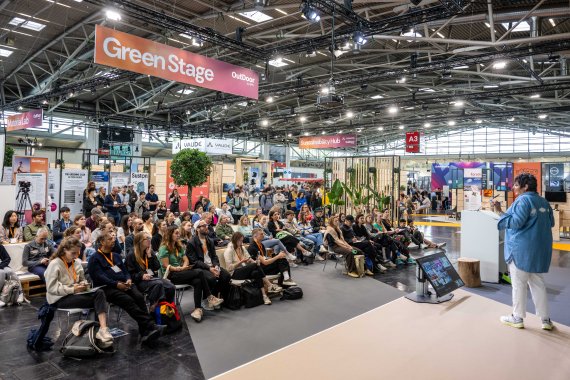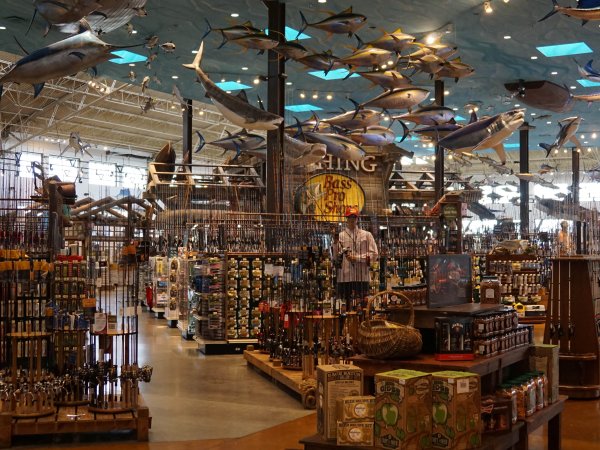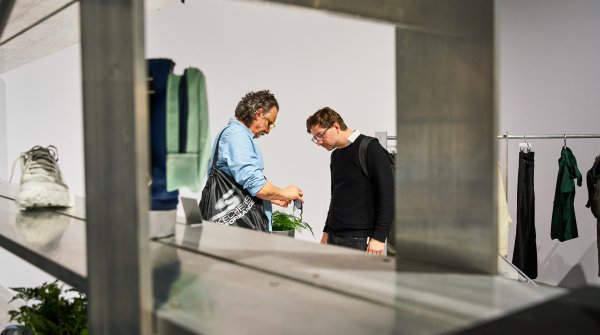In a deep dive into the market and the circumstances, expert Jeff Carter gives us some insights. He is Director of Merchandising for the US retailer Mast General Store, which operates ten stores in four different US states. The company has been around since 1883, and the storytelling in stationary retail is also based on its long history. Creaky wooden floors, antique curiosities on the wall, sweets at the counter - when you enter the stores, you embark on a journey through time.
Jeff describes this approach as experiential retail. The heart of the retail chain is the head office, on the basis of which the other stores were designed. "As a general store, we traditionally had everything from the cradle to the coffin. And even today, we have something for everyone - from outdoor equipment and clothing to old-school sweets."
Retail as a special experience therefore takes center stage. "We focus strongly on the guest experience, as we call our customers." The in-store experience should feel like an invitation home. "That's exactly how we want to treat people in-store and offer them an experience that they don't get in typical retail stores." A high number of customer advisors on the floor convey a high-quality shopping experience. "I would summarize our concept under the slogan 'personal service with a nostalgic flair'."
Personal service plays a particularly important role here, also as a driver of loyalty. As in Europe, expertise and individual adaptation to the needs of the target group pay off. Personal customer relationships are also the keyword in the Mast General stores, which sets them apart from large department stores. Although the retailer also has an e-commerce platform, the focus is on personal contact. Accordingly, there is intensive customer care instead of self-service check-outs.
This makes perfect sense for the brick-and-mortar retailer, as the stores are located in the immediate vicinity of the Appalachian Trail, offering product demonstrations and community events, as well as supporting various events in the area. The specialist expertise in the footwear sector, more specifically in individual fitting, also pays off. "Most of our sales partners work with us on in-store training and in-store demonstrations. Our employees are therefore very, very well trained when it comes to fitting shoes," says Jeff, explaining another touchpoint where a loyal customer base can be built up. As also described in the Deloitte Retail Industry Outlook for 2024, loyalty is currently an important factor.
When it comes to ordering, trade shows are still essential for the 18-strong team in Purchasing, which Jeff heads up.
In addition to community activations and offers to strengthen customer loyalty, further strategies are currently needed to attract price-conscious customers. Jeff Carter sees this as the biggest challenge at the moment.
"What we have noticed in the last 18 months is a price sensitivity among customers that we have never experienced before. Of course, we've all seen some surprising increases during COVID. Consumers now have to decide differently than before what kind of products they want to buy and how much they need to buy."
Jeff believes it is important to include products at entry-level price points and in the composition of the range in order to generate growth. "We have had to reposition some brands and look for brands in the lower price segment to show our guests that we have something for everyone."
However, there is still a market for high-end and technical products. "While we are finding that the higher price point is holding its own with its existing customers, the growth for us is in the lower price point brands that we are now bringing into stores." While Mast General Store relies on strong and long-standing relationships with its suppliers, it has worked closely together on a brand basis to offer more products in the entry-level price segment. At the same time, it is always a good idea to remain open to innovations or appealing offers from new brands.
As far as innovations are concerned, Jeff Carter sees sustainability as a topic that does not yet have the same weighting in outdoor retail in the USA as it does in Europe, especially in the trade show sector. He explains this using the example of OutDoor 2023: "The show and also the exhibitors* are much more focused on sustainability than what I've seen, at least in our part of the States and at the shows we go to. While we certainly talk about it, so far it's not happening with the emphasis that I've seen here."
Jeff also sees this as an advantage for all retailers looking into the issue. "I know our company has always focused on being environmentally friendly and supporting our suppliers who are not. OutDoor has once again reinforced and encouraged me in this respect. The most important thing I've taken away so far is the focus on sustainability and the real opportunity we still have in the States to make this a bigger priority for us."

He sees a greater focus on green issues, particularly among younger target groups - including a willingness to pay more for a more sustainable product. There is a greater interest in companies, whether brands or retailers, that attach importance to doing business in a more environmentally friendly way.
At the same time, a general shift in the mindset of outdoor customers can also be observed in the US market. The big buzzword: athleisure. "It's much more casual and fashion-focused, even with most of our outdoor brands, even if they still have technical aspects. Many of them have moved towards fashion. And I think that's what our customers want too. It's no longer as important how quickly a shirt dries as it is what they like." Style and cut are therefore playing an increasingly important role, whether in combination with the function of the garment or as a primary aspect of it.

The multisport aspect of the equipment is just as important - "the younger target group in particular pays attention to this." Particularly because rental and second-hand equipment do not play a major role in the Mast General Store area, a wide range of uses for equipment is also an argument in terms of more sustainable purchasing behavior.
- Experience retail: personal service with a nostalgic flair works.
- Service quality: Focus on advice on shoes and the right equipment for employees: in-house training and product demos, etc.
- Sustainability: In Europe, sustainability is a bigger focus than in the US.
- Price sensitivity: A major challenge in the current buying climate - repositioning brands to appeal to all customers. There is currently growth potential in these areas.
- Focus on lifestyle and fashion aspects of outdoor equipment: Customers prioritize fit and style over technical details.
- Multisport products with a focus on sustainability in younger target groups.
- Awards
- Mountain sports
- Bike
- Fitness
- Health
- ISPO Munich
- Running
- Brands
- Sustainability
- Olympia
- OutDoor
- Promotion
- Sports Business
- Textrends
- Triathlon
- Water sports
- Winter sports
- eSports
- SportsTech
- OutDoor by ISPO
- Heroes
- Transformation
- Sport Fashion
- Urban Culture
- Challenges of a CEO
- Trade fairs
- Sports
- Find the Balance
- Product reviews
- Newsletter Exclusive Area
- Magazine






